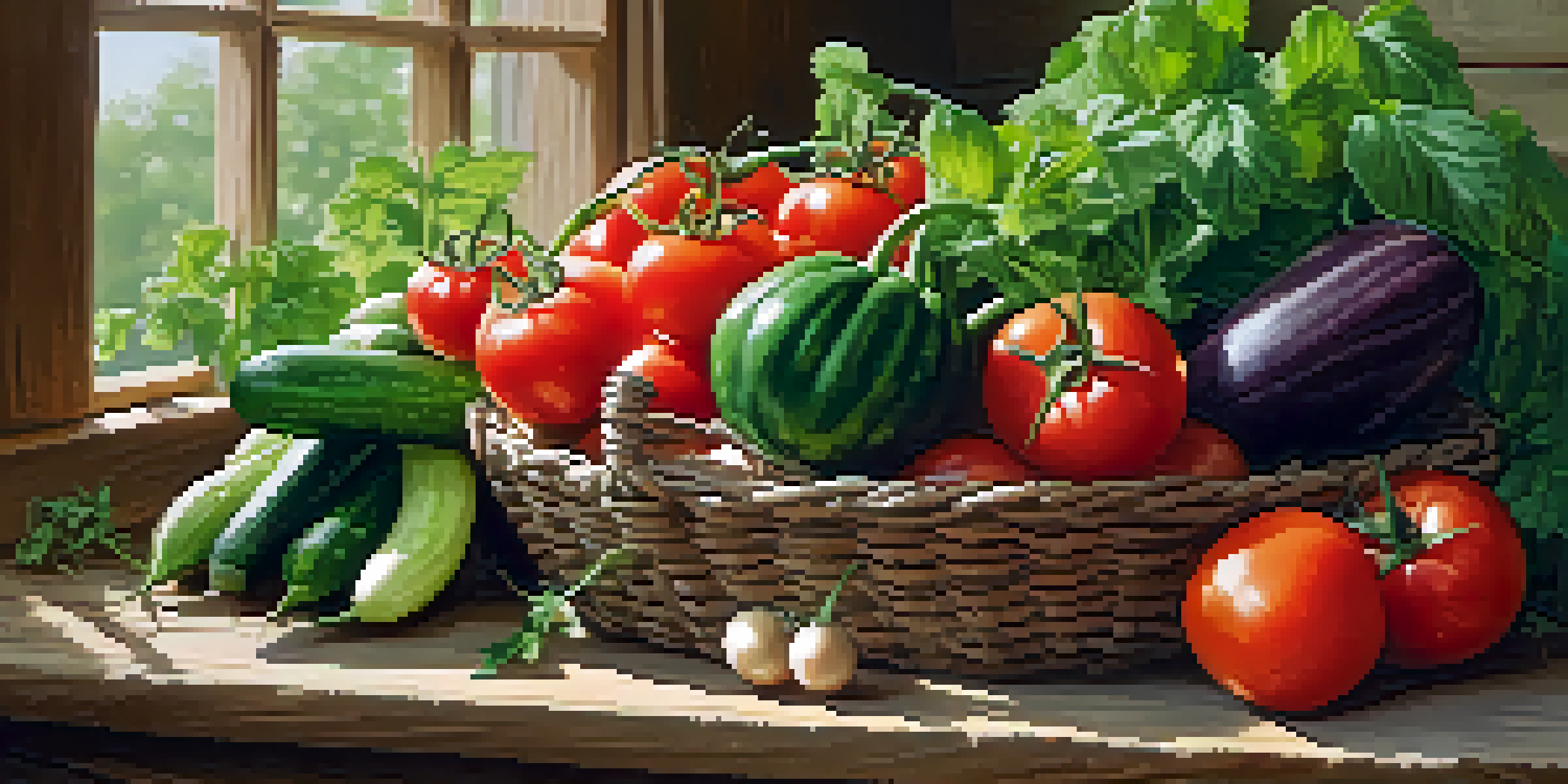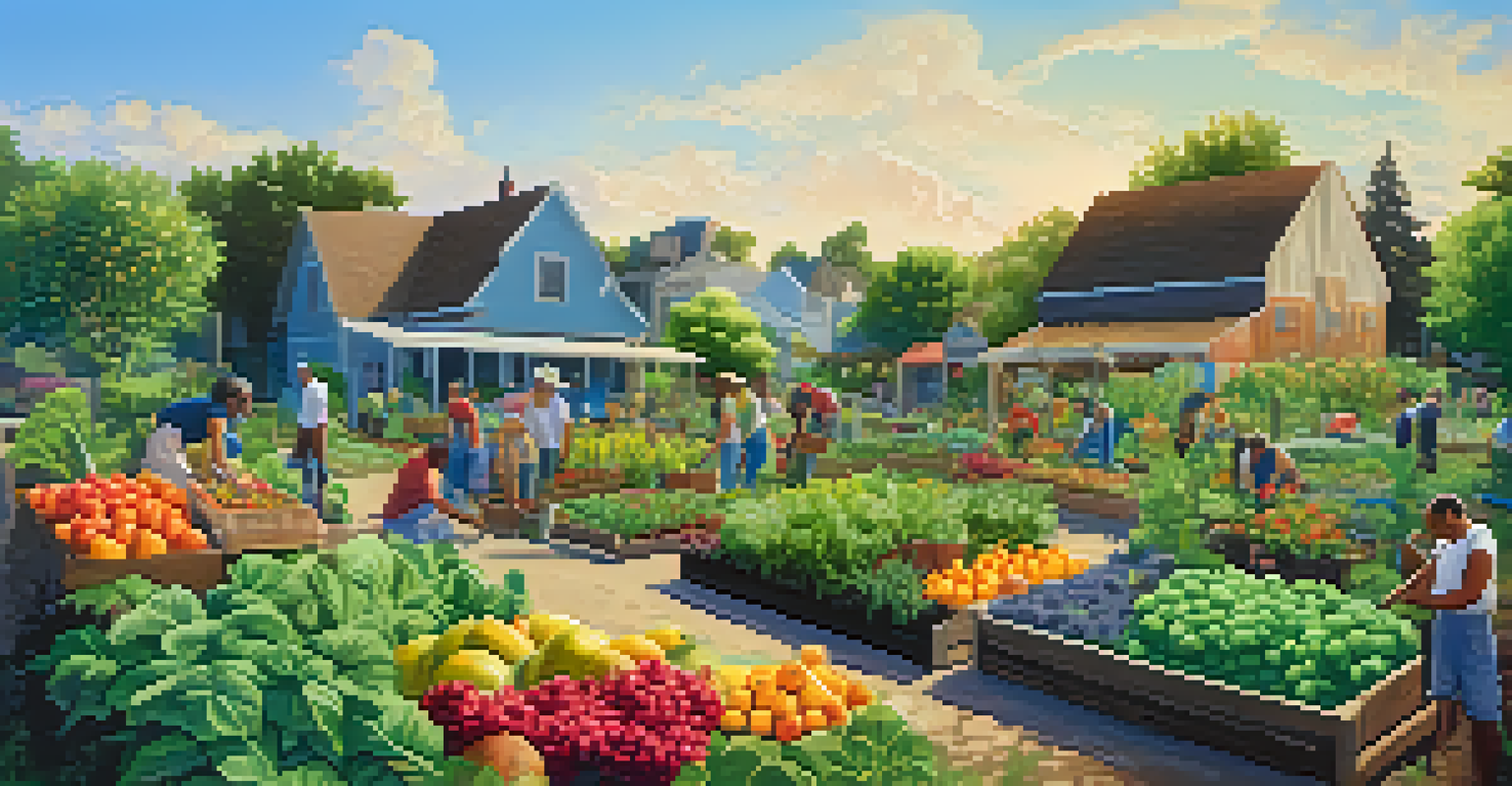Community Gardens: Promoting Vegetarianism and Food Security

Understanding Community Gardens and Their Purpose
Community gardens are shared plots of land where individuals come together to grow fruits, vegetables, and flowers. These gardens create a sense of community and encourage participants to engage in sustainable practices. By fostering collaboration, they promote not only gardening skills but also a deeper connection to the food we eat.
To plant a garden is to believe in tomorrow.
The purpose of community gardens extends beyond mere food production; they serve as educational spaces where people can learn about nutrition, agriculture, and sustainable living. In many urban areas, access to fresh produce can be limited, making these gardens vital for improving local food security. They empower residents to take charge of their food sources, leading to healthier dietary choices.
Moreover, community gardens can play a crucial role in promoting vegetarianism. By providing a space to grow a variety of vegetables and herbs, these gardens inspire participants to explore plant-based meals. This hands-on experience can shift perceptions about vegetarianism, showcasing it as a delicious and fulfilling lifestyle choice.
The Link Between Community Gardens and Vegetarianism
When people grow their own vegetables, they often become more inclined to incorporate them into their diets. Community gardens can spark a newfound appreciation for fresh produce, which may encourage participants to choose vegetarian meals more frequently. This exposure helps to demystify vegetarian cooking and inspire creativity in meal preparation.

Additionally, community gardens provide a diverse array of vegetables, allowing participants to experience different flavors and textures. This variety can help break the stereotype that vegetarian meals are boring or lack substance. As people experiment with their gardening harvests, they may discover exciting plant-based recipes that they never considered before.
Community Gardens Boost Food Security
These gardens enhance local food production, helping communities access fresh produce and combat food insecurity.
Furthermore, the sense of community fostered in these gardens often leads to shared meals and potlucks, where vegetarian dishes take center stage. These gatherings not only promote social bonds but also provide an opportunity for participants to share their culinary creations. As they witness the joy and satisfaction of their peers enjoying plant-based meals, they may be further motivated to embrace vegetarianism.
Enhancing Food Security Through Local Production
Food security is a pressing issue in many communities, and community gardens offer a practical solution by increasing local food production. By growing food locally, communities can reduce their reliance on distant food sources, which may be subject to price fluctuations and transportation challenges. This self-sufficiency helps ensure that residents have access to fresh, nutritious foods.
Gardening adds years to your life and life to your years.
Moreover, community gardens often focus on growing crops that are culturally significant to the participants. This not only enhances food security but also promotes cultural diversity and inclusion. By cultivating traditional crops, community members can enjoy the foods they love while also sharing their heritage with others.
The impact of community gardens on food security can be profound, particularly in urban areas where access to fresh produce is limited. These gardens can serve as vital resources, providing food during times of economic hardship. As community members come together to grow and share their harvests, they build resilience against food insecurity.
Educational Opportunities in Community Gardens
Community gardens are more than just places to grow food; they serve as educational hubs that teach valuable skills. Participants can learn about gardening techniques, pest management, and the benefits of organic farming through hands-on experience. These lessons promote sustainable practices that participants can adopt in their own homes, encouraging a healthier lifestyle.
In addition to gardening skills, community gardens often offer workshops on cooking, nutrition, and preserving food. These educational opportunities help participants understand the importance of a balanced diet and the role of plant-based foods in their overall health. By equipping individuals with knowledge, community gardens empower them to make informed dietary choices.
Gardens Promote Vegetarian Lifestyles
By providing diverse vegetables and fostering a hands-on experience, community gardens inspire participants to embrace plant-based meals.
Furthermore, engaging with local schools or organizations can expand educational outreach. Children and young adults can learn about food systems, the environment, and the benefits of vegetarianism through interactive gardening projects. This early exposure can shape their attitudes towards food and health, fostering a generation more inclined to embrace plant-based living.
Building Community Connections Through Gardening
One of the most beautiful aspects of community gardens is the connections they foster among participants. These shared spaces bring people from different backgrounds together, creating a sense of belonging and camaraderie. As individuals work side by side, they share stories, experiences, and gardening tips, strengthening community ties.
These connections can lead to collaborative efforts beyond the garden itself. Participants may organize events, workshops, or even advocacy initiatives to promote local food security and vegetarianism. By working together, they can amplify their voices and drive change within their communities, making a lasting impact.
The friendships that blossom in community gardens can also translate into support networks. Whether it's sharing resources, swapping produce, or offering assistance during busy planting seasons, these relationships create a safety net for participants. This sense of community enhances the overall gardening experience and fosters a spirit of cooperation.
Overcoming Challenges in Community Gardening
While community gardens offer numerous benefits, they also face challenges that can hinder their success. Issues such as limited funding, land access, and community engagement can pose obstacles. Addressing these challenges requires collective effort and a strategic approach to ensure the sustainability of the gardens.
Building relationships with local governments and organizations can help secure resources and support for community gardens. By advocating for policies that promote urban agriculture, participants can create a more favorable environment for gardening initiatives. Engaging with the community through outreach and education can also cultivate interest and involvement.
Educational Hubs for Sustainable Living
Community gardens serve as educational spaces, teaching participants valuable skills about nutrition, gardening, and sustainable practices.
Moreover, fostering a sense of ownership among participants is crucial for sustaining community gardens. When individuals feel invested in the success of the garden, they are more likely to contribute time and resources. Encouraging active participation can help overcome challenges and ensure that community gardens thrive for years to come.
The Future of Community Gardens and Their Impact
As urbanization continues to rise, the importance of community gardens cannot be overstated. They offer a sustainable solution to food insecurity while promoting healthier eating habits, particularly vegetarianism. By bringing people together to grow food, these gardens create a sense of purpose and community that can have lasting effects.
The future of community gardens lies in their ability to adapt and innovate. Incorporating technology, such as urban farming techniques or vertical gardens, can maximize space and resources. These advancements can help communities produce more food while minimizing environmental impact, ensuring that community gardens remain relevant.

Ultimately, community gardens have the potential to reshape our relationship with food and foster a culture of sustainability. By promoting vegetarianism and enhancing food security, they pave the way for healthier, more connected communities. As we look to the future, supporting and expanding these initiatives will be essential in creating a more sustainable food system.